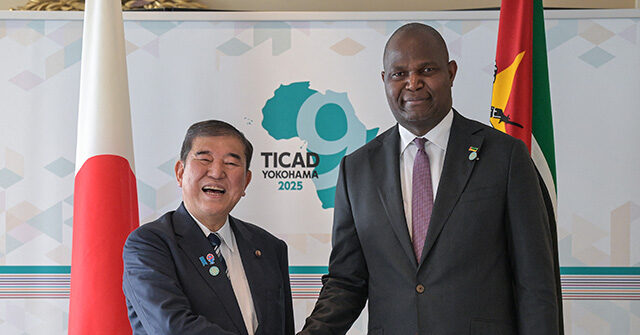The Japanese government struggled this week to convince a public nervous about demographic decline that its “African Hometown” program is not a backdoor scheme to set up mass migration from Africa to Japan.
The controversy began last Thursday, when the Japan International Cooperation Agency (JICA) designated four Japanese cities to participate in the Africa Hometown program with four cities in Mozambique, Nigeria, Ghana, and Tanzania.
The Nigerian government immediately announced that Japan would “create a special visa category for highly skilled, innovative, and talented young Nigerians who want to move to Kisarazu to live and work.” Kisarazu is the Japanese city chosen to pair with Nigeria.
“Artisans and other blue-collar workers from Nigeria who are ready to upskill will also benefit from the special dispensation visa to work in Japan,” the Nigerian statement said.
The office of Nigerian President Bola Tinubu claimed the decision to issue these special visas was made at the Ninth Tokyo International Conference on African Development, or TICAD 9, which was held last week in Yokohama, Japan.
The Japanese public erupted in fury at the announcement, their anger further heightened when they discovered Google Maps was suddenly identifying the Kisarazu city office as the “Nigerian city office.”
Residents of the other three Japanese cities involved in the program – Sanjo, Nagai, and Imabari – flooded their own municipal governments with inquiries as news of the Nigerian statement about work visas for Kisarazu spread.
Japan is suffering from one of the worst demographic declines in the world and was once cited as the premier example of a society and economy deformed by low birth rates, although some other countries have since found themselves in even worse predicaments. The Japanese government has identified population decline as one of the most urgent crises faced by the nation.
The one step most Japanese citizens do not want to take to address their demographic crisis is importing huge numbers of foreigners to pad out the population. Public opinion has shifted slightly in favor of importing tightly controlled numbers of workers for certain industries, especially care for the young and elderly, but opposition to mass migration remains broad and deep.
the left-wing UK Guardian rushed to denounce the Japanese public as “xenophobic” for their “ugly backlash” against migration.
“Some critics appeared to believe that ‘hometown’ status meant that people from the African countries would be given special permission to live and work in their Japanese partner cities,” the Guardian sneered, gliding past the fact that Nigerian officials explicitly stated the program would work exactly that way.
Another “misunderstanding” came from the Tanzania Times, which published an article under the headline “Japan Dedicates Nagai City to Tanzania.” When the headline was translated into Japanese, “dedicates” was replaced with a word that can mean “sacrificed.”
Naturally, left-wing media outlets were unwilling to consider the possibility that Japanese citizens might be looking at the unpleasant transformations wrought upon Europe by mass migration and rationally deciding they wanted no part of it, rather than succumbing to mass panic and mindless xenophobia.
Officials in the four Japanese cities struggled to handle “hundreds of phone calls and thousands of emails from residents.”
“We did not ask to accept migrants or ease special working visa requirements for Nigerians,” Kisarazu Mayor Watanabe Yoshikuni declared on Monday.
Imabari Mayor Shigeki Tokunaga said there was “absolutely no truth to claims that Japanese territory, or the authority of a local government, will be transferred.” He urged his citizens not to spread “baseless information, or information based on factual errors.”
“It is not true that the city has requested to accept migrants or immigrants from Ghana, and the city has no plans to make such a request in the future,” Sanjo Mayor Ryo Takizawa said in a statement.
The national government in Tokyo quickly got involved, asking African officials and publications to correct “inaccuracies and potentially misleading information.”
The JICA hastened to explain that the “Africa Hometown” program was merely a sort of sister city relationship, primarily involving cultural exchanges and symbolic gestures of goodwill.
“Several media reports and statements by an African government, including coverage from the Tanzania Times, Premium Times (Nigeria), Business Insider Africa, and BBC News Pidgin, have contained inaccuracies and potentially misleading information,” the JICA statement said.
According to JICA, the four Japanese cities were chosen for the program because they had existing ties to African countries. Nagai, for example, hosted Tanzanian athletes during the Tokyo Olympics and Paralympics in 2020.
Read the full article here


